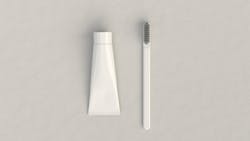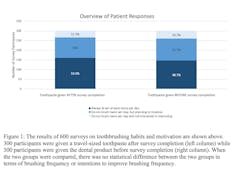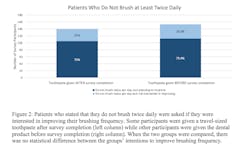Do free dental products motivate patients to improve their hygiene habits?
As dental professionals, we want to help our patients make good decisions. We think about our conversations, our oral hygiene instructions, and even wonder if giving patients goody bags of dental products motivates them to brush more. When I was an endodontics resident, I’ve asked myself, “How can I motivate patients to improve their oral hygiene so they don’t need more root canals?”
Recently, I’ve been increasing my efforts to talk with patients about oral hygiene in the hopes of helping them avoid extensive dental work in the future. I was reading a smoking cessation article and thought that the same study design might be helpful for analyzing the motivation to improve oral hygiene. The study that inspired me was published by Cunningham and colleagues in 2016.1 It was fascinating!
In the study, the researchers asked more than 2,000 current smokers to participate in a phone survey. They asked if they were interested in quitting smoking and if so, when. The interesting part was that half of the smokers were told about the availability of free nicotine replacement products right before they answered the questions. They hadn’t had a chance to use the products, but knew they could in the future.
This simple difference led the smokers offered the free nicotine replacement products before the survey to say that they were more interested in quitting smoking and would like to do so soon, sooner than the other group indicated. Wow! Verbally offering free nicotine replacement products had a strong psychological impact on smokers’ interest in quitting. This made me wonder if free oral hygiene products might also motivate patients to improve their brushing habits.
I was curious but could not find a study that had investigated this. Does it actually make a difference giving our patients free samples of toothpaste and other dental necessities? If we hand out free dental products at events or when our patients leave our offices, do they become more interested in improving their oral hygiene? During the past year, I surveyed patients on this very topic. The findings surprised me.
At the Medical University of South Carolina, I surveyed 600 patients and their companions, all 18 or older. On alternating days, I gave patients travel-size toothpaste samples either before or after completing the survey. This allowed me to talk to 300 people who were given toothpaste samples beforehand and 300 people who took the survey without knowing they’d receive free toothpaste. The survey had two multiple choice questions:
1. How often do you brush your teeth each day?
2. Would you be interested in improving your brushing frequency?
Overall, the two groups of 300 participants were remarkably similar. The overview of responses is shown in Figure 1. In total, about 51% of participants (of the 600) said they brushed at least twice a day. Statistical analysis showed no difference in brushing frequency or motivation between the groups regardless of whether they received toothpaste before or after the survey. This means that about half of our patients need to brush more frequently. It’s also likely that many of the people brushing twice daily would benefit from improvements in their brushing technique, such as brushing time and toothbrush motion.
Next, I took a close look at the participants who did not brush twice daily. In Figure 2, notice that the groups were again remarkably similar. Initially, it even appeared that participants given toothpaste before the survey were less interested in improving their brushing frequency. The statistical analysis showed that this is likely due to random chance. Statistically, it seems that giving free toothpaste samples does not change someone’s interest in improving brushing frequency.
If giving free toothpaste samples to patients doesn’t motivate them, what does? Toothpaste is certainly a necessary part of a good oral hygiene regimen, but most people already have toothpaste at home. As dental professionals we can continue to provide toothpaste, toothbrushes, floss, and other tools to help empower our patients, but we must also empower them in other ways.
We have many opportunities to motivate our patients. In fact, the survey participants offered comments about what would motivate them most. Some of their most frequent responses were, “If my hygienist or dentist told me that I needed to brush more, I would,” “If I understood why it is beneficial to me, then I’d spend more time brushing,” and “If I knew I had gum problems or cavities, I would brush more.”
Patients want to understand why it’s important to complete these mundane tasks. The results of the survey surprised me because I believed that giving toothpaste to patients would motivate them, even if it was just a small nudge in the right direction. I’ve never advocated for giving patients dental products and then simply showing them to the door. The responses tell me that what will do the trick is good old-fashioned conversation about the importance of brushing, discussing individual oral health status, and encouraging patients along the way.
Reference
1. Cunningham JA, Kushnir V, McCambridge J. The impact of asking about interest in free nicotine patches on smoker’s stated intent to change: Real effect or artefact of question ordering?. Nicotine Tob Res. 2016;18(5):1215-1217.
Lauren E. Kuhn, DMD, MSD, is a 2017 graduate of the Harvard School of Dental Medicine and the daughter of an RDH. She graduated in 2019 with an endodontics certificate and master’s degree from the Medical University of South Carolina. She’s been named an affiliate assistant professor in the department of oral rehabilitation at the Medical University of South Carolina. She’s passionate about community service, and she frequently volunteers at free dental clinics.
About the Author

Lauren E. Kuhn, DMD, MSD
Lauren E. Kuhn, DMD, MSD, is a 2017 graduate of the Harvard School of Dental Medicine and the daughter of an RDH. She graduated in 2019 with an endodontics certificate and master’s degree from the Medical University of South Carolina. She’s been named an affiliate assistant professor in the department of oral rehabilitation at the Medical University of South Carolina. She’s passionate about community service, and she frequently volunteers at free dental clinics.


